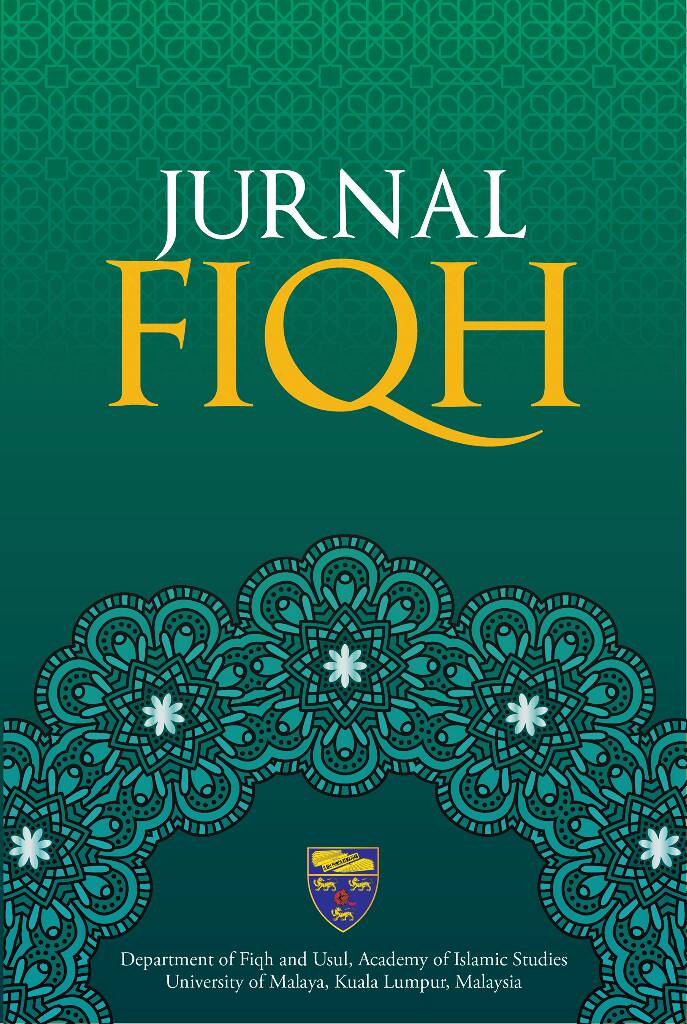حكم التدخلات التقنية بغرض إطالة عمر الإنسان وتأخير مظاهر الشيخوخة في الفقه الإسلامي
The Ruling on Technological Interventions to Extend Human Life and Delay the Signs of Aging Under Islamic Jurisprudence
DOI:
https://doi.org/10.22452/fiqh.vol22no1.7Keywords:
Technological Interventions, Human Body, Islamic Jurisprudence.Abstract
Artificial intelligence (AI) has become widespread in recent times for various aspects , including medical aspects. Some of which aims to extend human life and delay the signs of aging. The research problem of this study lies in clarifying the perspective of Islamic jurisprudence on the intervention of technology in the human body. The objectives of this research is to discuss the technological interventions aimed at extending human life and delaying the signs of aging, and to explore the jurisprudential ruling. The research adopted a descriptive and deductive research approach to obtain the research objectives. Regarding technological interventions aimed at prolonging human life and delaying the signs of aging, the study divided these interventions into three approaches. The first is the biological method that is based on advances in genetics and biotechnology and focuses on enhancing the immune system genetically. The study concluded that such method is impermissible. The second method is the electronic method which is based on advances in nanotechnology and robotics, and focuses on various parts of the body with artificial substitutes, such as artificial skin. The study found that the ruling on such method varies depending on the situation. As such, replacing damaged human body parts with prosthetic limbs is regarded permissible since it falls under the type of medical treatment. Moreover, regarding the technological interventions to enhance human capabilities, it is found that an in-depth study is required to explore such an issue. The third method is the virtual method known as mind uploading which involves digitizing the information contained in the brain -such as memories, and information- and then transferring it to a machine. From the perspective of Islamic jurisprudence, this method is considered permissible; however, it must not cause any harm to the brain.
Downloads
References
Aḥmad Saʿd al-Buraʿī, “Al-Taʿdīlāt al-Bayūlūjīyah ʿAlá al-Jasad al-Insānī Min Khilāl al-Dhakāʾ al-Ṣināʿī: Manẓūr Dīnī,” al-Majallah al ʿIlmīyah li-Jāmiʿat al-Malik Fayṣal – al-ʿUlūm al-Insānīyah wa-al-Idārīyah 23 (2022).
al-Amīr al-Ṣanʻānī, Muḥammad ibn Ismāʻīl. Subul al-Salām. alDammām: Dār Ibn al-Jawzī, 2001.
al-Ashqar, ʻUmar Sulaymān. al-Qaḍāʼ wa-al-Qadar. ʻAmmān: Dār al-Nafāʼis, 2005.
al-ʻAynī, Maḥmūd ibn Aḥmad. Nukhab al-afkār fī Tanqīḥ Mabānī al-akhbār fī sharḥ maʻānī al-Āthār. taḥqīq: Yāsir Ibrāhīm. Qaṭar: Wizārat al-Awqāf wa-al-Shuʼūn alIslāmīyah, 2008.
al-ʻAẓīm Ābādī, Muḥammad Ashraf ibn Amīr. ʻAwn al-Maʻbūd sharḥ Sunan Abī Dāwūd. Beirut: Dār al-Kutub alʻIlmīyah, 1995.
al-Bayhaqī, Aḥmad ibn al-Ḥusayn. al-Sunan al-Kabīr. taḥqīq: D. Abd Allāh al-Turkī. al-Qāhirah: Markaz Hajar lilBuḥūth wa-al-Dirāsāt al-ʻArabīyah wa-al-Islāmīyah, 2011.
al-Bukhārī, Muḥammad ibn Ismāʻīl. Ṣaḥīḥ al-Bukhārī. Dimashq: Dār Ibn Kathīr, 2002.
al-Ghumārī, ʻAbd Allāh Muḥammad al-Ṣiddīq. al-Aḥādīth alMukhtārah fī al-Akhlāq wa-al-Ādāb al-Musammá alGharāʼib Wālwḥdān. al-Qāhirah: Maktabat al-Qāhirah, 2015.
al-Ḥākim al-Nīsābūrī, Muḥammad ibn ʻAbd Allāh. al-Mustadrak ʻalá al-ṣaḥīḥayn, taḥqīq: Muṣṭafá ʻAṭā. Beirut: Dār alKutub al-ʻIlmīyah, 1990.
al-Haythamī, ʻAlī ibn Abī Bakr. Mawārid al-ẓamʼān ilá Zawāʼid Ibn Ḥibbān, taḥqīq: Ḥusayn Asad. Dimashq: Dār alThaqāfah al-ʻArabīyah, 1992.
Allen Buchanan, Beyond humanity? The ethics of biomedical enhancement. Oxford: Oxford University Press, 2011.
al-Mubārakfūrī, Muḥammad ʻAbd al-Raḥmān ibn ʻAbd al-Raḥīm. Tuḥfat al-Aḥwadhī bi-sharḥ Jāmiʻ al-Tirmidhī. Beirut: Dār al-Kutub al-ʻIlmīyah, 1990.
al-Munāwī, ʻAbd al-Raʼūf ibn Tāj al-ʻārifīn. Fayḍ al-qadīr sharḥ al-Jāmiʻ al-Ṣaghīr. Beirut: Dār al-Maʻrifah, 1972.
al-Nawawī, Yaḥyá ibn Sharaf. al-Minhāj sharḥ Ṣaḥīḥ Muslim ibn al-Ḥajjāj. Beirut: Muʼassasat al-Risālah, 2015.
al-Qārī, ʻAlī ibn Sulṭān. Mirqāt al-mafātīḥ sharḥ Mishkāt alMaṣābīḥ. Beirut: Dār al-Fikr, 2002.
al-Qurṭubī, Muḥammad ibn Aḥmad. al-Jāmiʻ li-aḥkām al-Qurʼāntafsīr al-Qurṭubī, taḥqīq: Aḥmad al-Baraddūnī waIbrāhīm Aṭṭafayyish. al-Qāhirah: Dār al-Kutub alMiṣrīyah, 1964.
al-Samʻānī, Manṣūr ibn Muḥammad. Tafsīr al-Qurʼān, taḥqīq: Yāsir Ibrāhīm wghnym Ghunaym. al-Riyāḍ: Dār alwaṭan, 1997.
al-Ṭabarānī, Sulaymān ibn Aḥmad. al-Muʻjam al-Awsaṭ, taḥqīq: Ṭāriq Muḥammad wa-ʻAbd al-Muḥsin al-Ḥusaynī. alQāhirah: Dār al-Ḥaramayn, 1995.
al-Tirmidhī, Muḥammad ibn ʻĪsá. al-Jāmiʻ al-kabīr-Sunan alTirmidhī, taḥqīq: Bashshār Maʻrūf. Beirut: Dār alGharb al-Islāmī, 1998.
F. Allhoff, P. Lin, J.H. Moor, and J. Weckert, “Ethics of Human Enhancement: 25 Questions & Answers,” Studies in Ethics, Law, and Technology 4 (2010).
Ibn Abī al-ʻIzz al-Ḥanafī, Muḥammad ibn ʻAlī. Sharḥ al-ʻAqīdah al-Ṭaḥāwīyah, taḥqīq: Shuʻayb al-Arnaʼūṭ. Beirut: Muʼassasat al-Risālah, 1997.
Ibn Abī Shaybah, ʻAbd Allāh ibn Muḥammad. al-Kitāb almuṣannaf fī al-aḥādīth wa-al-āthār, taḥqīq: Kamāl alḤūt. al-Riyāḍ: Maktabat al-Rushd, 1989.
Ibn al-Athīr, al-Mubārak ibn Muḥammad. al-nihāyah fī Gharīb alḥadīth wa-al-athar, taḥqīq: Ṭāhir al-Zāwī wa-Maḥmūd al-Ṭanāḥī. Beirut: al-Maktabah al-ʻIlmīyah, 1979.
Ibn al-Jawzī, ʻAbd al-Raḥmān ibn ʻAlī. Kashf al-mushkil min Ḥadīth al-ṣaḥīḥayn, taḥqīq: ʻAlī al-Bawwāb, al-Riyāḍ: Dār al-waṭan, 1997.
Ibn Fūrak, Muḥammad ibn al-Ḥasan. Mushkil al-Ḥadīth waBayānih, taḥqīq: Marsá ʻAlī. Beirut: ʻĀlam al-Kutub, 1985.
Ibn Ḥajar al-ʻAsqalānī, Aḥmad ibn ʻAlī. Fatḥ al-Bārī sharḥ Ṣaḥīḥ al-Bukhārī. al-Riyāḍ: Dār Ṭaybah, 2005.
Ibn Ḥanbal, Aḥmad ibn Muḥammad. Musnad al-Imām Aḥmad ibn Ḥanbal, taḥqīq: Shuʻayb al-Arnaʼūṭ. Beirut: Muʼassasat al-Risālah, 2001.
Ibn Ḥibbān, Muḥammad ibn Ḥibbān. al-iḥsān fī Taqrīb Ṣaḥīḥ Ibn Ḥibbān, taḥqīq: Shuʻayb al-Arnaʼūṭ. Beirut: Muʼassasat al-Risālah, 1988.
Ibn Jarīr al-Ṭabarī, Muḥammad ibn Jarīr. Jāmiʻ al-Bayān fī Taʼwīl al-Qurʼān, taḥqīq: Aḥmad Shākir. Beirut: Muʼassasat al-Risālah, 2000.
Ibn Kathīr, Ismāʻīl ibn ʻUmar. Tafsīr al-Qurʼān al-ʻAẓīm, taḥqīq: Sāmī Salāmah. al-Riyāḍ: Dār Ṭaybah, 1999.
Ibn Mājah, Muḥammad ibn Yazīd. Sunan Ibn Mājah, taḥqīq: Shuʻayb al-Arnaʼūṭ, Beirutt: Dār al-Risālah alʻĀlamīyah, 2009.
Ibn Taymīyah, Aḥmad ibn ʻAbd al-Ḥalīm. Majmūʻ al-Fatāwá, taḥqīq: ʻAbd al-Raḥmān Qāsim. al-Madīnah alMunawwarah: Majmaʻ al-Malik Fahd li-Ṭibāʻat alMuṣḥaf al-Sharīf, 1995.
J. Rueda, “The ethics of Doing Human Enhancement Ethics,” Futures 153 (2023).
L.Gaitán, “Heaven on Earth: The Mind Uploading Project as Secular Eschatology,” Theology and Science 17 (2019).
M.Batin, A. Turchin, S. Markov, A. Zhila, and D. Denkenberger, “Artificial Intelligence in Life Extension: from Deep Learning to Superintelligence,” Informatica 41 (2017).
Muḥammad Ṣāliḥ al-Munajjid, “Taḥsīn wa-Tanshīṭ Aʿḍāʾ al-Jism fī Marḥalat al-Shaykhūkhah: Hal Yuʿāriḍu Ḥadīth (Illā al-Ḥaram)?” Fatwá raqm 427015. Updated 19 July 2023, accessed 2 May 2025, https://islamqa.info/ar/answers/427015.
Munīr Muḥammad Sālim, “Ṭibb al-Nānw: al-Āfāq wa-alMakhāṭir,” Majallat ʿAjmān lil-Dirāsāt wa-al-Buḥūth 10 (2011).
Muslim, Muslim ibn al-Ḥajjāj. Ṣaḥīḥ Muslim. al-Riyāḍ: Dār Ṭaybah, 2006.
Sīrīn Usāmah Jarādāt, “al-Rukhaṣ al-Sharʻīyah wa-Taṭbīqātuhā fī ẓill Intishār al-Awbiʼah: Dirāsah Fiqhīyah Muqāranah,” Jarash lil-Buḥūth wa-al-Dirāsāt 22 (2021).
Sulwān Qadrī Aḥmad, “Istikhdām al-Sharīḥah al-Dimāghīyah fī Taʿzīz al-Ṣiḥḥah Min Manẓūr Fiqhī,” Majallat alBuḥūth al-Fiqhīyah wa-al-Qānūnīyah 43 (2023).
Yasemin J. Erden and Philip A. E. Brey, “Ethics Guidelines for Human Enhancement R&D,” Science 378 (2022).













